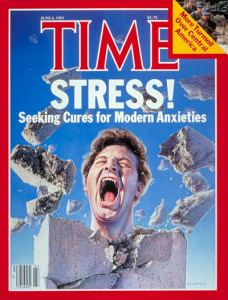STRESS
The Silent Killer
Everyone reacts to stress differently
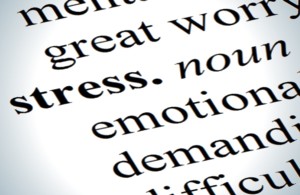
Stress
Each body sends out its own set of red flags. According to the American Psychological Association, some people may not even feel the physical or emotional warning signs until hours or days of stressful activities. However, when you notice a stiff back or that you are snapping at loved ones, pay attention to the signs and listen to what your body is telling you. The warning signs of stress are not to be taken lightly or ignored. By noticing how we respond to stress, we can manage it better and in healthy ways which will help our body correct itself, reducing the high cost and care of chronic, long-term health problems.
.
75-90% of primary care physician visits are for stress related problems
Time Magazine’s June 6, 1983 cover story called stress “The epidemic of the Eighties”, and referred to it as our leading health problem. There can be little doubt that the situation has worsened since then. Numerous surveys confirm that adult Americans perceive that they are under much more stress than a decade ago. A 1996 Prevention Magazine survey found that almost 75% feel that they have “great stress” one day a week with one out of three indicating that they feel this way more than twice a week. Imagine what the survey would find today, given increasing stress levels!
Types of Stress
PERSISTENT, CHRONIC, LOW-LEVEL STRESS
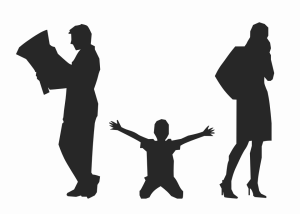
Types of Stress
We now know that persistent, chronic, low-level stress is a major cause of turmoil and suffering. Acute physical, chemical or mental stressors that have a well-defined beginning and end are something we are well designed to handle. However, it is the pervasive, on-going, ever-present stress of day-to-day living that we now see as the real villain.
Chronic, unrelenting stress involves demands that cause the wisdom of the body to divert energy normally used to maintain balanced thought and physical homeostasis. This diverted energy is then ready to be used for fight or flight. Energy focus is changed from inward to outward. This is proper if there is a real threat or danger.
Mental/Emotional: Fear, Worry, Anger, Resentment, Negative Auto Suggestion, etc.
Physical/Chemical/Biological: Slips, Falls, Strains, Accidents, Over Work, Over Eating, Insufficient Rest, Toxic Exposure, Malnutrition, Bacterial Exposure, etc.
Electromagnetic: Cell Phones, Computers, T.V., Electrical Devices, Cell Phone Towers, Power Lines, etc.
TWO KINDS OF STRESSFUL EVENTS
Simple: Obvious, Overt Situations Involving Pain and/or High Emotional Content, that have a very definite beginning and a very clear end, such as experienced by a primitive hunter meeting a wild beast in the jungle.
Complex/Contemporary: Involving stressful events that are, less defined, subtler, pervasive, and insidious.
Simple vs. Complex Stress – Simple stresses are those that can be overcome quickly, allowing the body to

Stress & Release
return to homeostasis. However, with the more complex stresses of modern societies, the danger may seem unavoidable and unending. Time pressures, money worries, chemical pollution, job challenges, prescription drugs, poor nutrition, threats of any kind, overwork, and environmental pollution are unrelenting. Without a clear ending, the body becomes trapped in a defensive, energy wasting, outer-reactive state.
SYMPTOMS OF STRESS
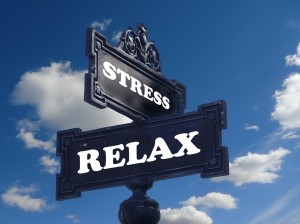
Stress & Relax
Stress is destroying our bodies with increased adrenaline and cortisol, a.k.a. the “Death Hormone.”
Stress also has negative effects on the skeletal system. Remaining in an unbalanced state causes spinal stress areas to form followed by neurological impingement, various symptoms, degeneration, and decay.
Noble Prize Winner Hans Selye proved that chronic disease is caused by stress. Stress can manifest itself physically as any of the following symptoms:
Traditionally, ordinary therapists have focused on the end result. Alphabioticists focus on the root cause – stress.
Cognitive Symptoms
- Memory problems
- Indecisiveness
- Inability to concentrate
- Difficulty in thinking clearly
- Poor judgment
- Seeing only the negative
- Anxious or racing thoughts
- Constant worrying
Emotional Symptoms
- Feeling tense and “on edge”
- Depression
- Agitation, short temper
- Restlessness
- Irritability, impatience
- Inability to relax
- Moodiness
- Feeling overwhelmed
Physical Symptoms
- Insomnia
- Headaches or backaches
- Fibromyalgia
- Weight gain or loss
- Muscle tension and stiffness
- Diarrhea or constipation
- Chest pain, rapid heartbeat
- Loss of sex drive
- Weakened immune system/frequent colds
Behavioral Symptoms
Using alcohol or drugs to relax
Working excessively and compulsively
Teeth grinding or jaw clenching
Eating excessively or insufficiently
Sleeping excessively or insufficiently
Isolating oneself from others, feeling nervous and insecure
LIVING WITH STRESS
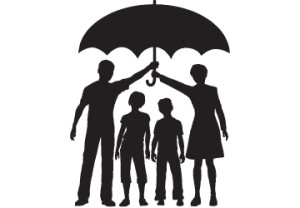
Live Better In Balance!
“Unrelieved stress is the cause of all disease!”
–Dr. Hans Selye, Father of Stress Research
“Ninety percent of all doctor visits are stress related!”
–American Medical Association
“Stress is the most common cause of all disease!”
–National Institute of Health
“The #1 health challenge in the world today is stress.”
–World health Organization
“Stress is the primary cause of disease.”
–Prof. Bruce Lipton, Research Biologist
Drugs, and Modern Medicine may not be the answer!
Diseases and physical conditions of the modern world and contemporary societies can be directly attributed to

Stress Symptoms
a more stressful lifestyle. What are the best treatments, and what can be done to relieve the suffering?
Conventional treatments for diseases such as type II diabetes, cancer, all varieties of heart disease, and
disorders like ulcers, depression, obesity, fibromyalgia and arthritis may or may not work. In some cases, placebos were more effective. The hands on physical practice of Alphabiotics has not only proven to be effective, but beneficial. Stress release allows ones inner wisdom to balance the mind and body in order to fight diseases, decrease tension, and increase strength so that life works better in every way.
